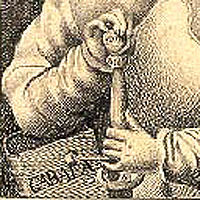Summary
 Paracelsus did not reject matter or nature as being evil, as did the Gnostics who repudiated material and earthly existence and any participation on the part of the jealous “authorities” (roughly equivalent to the stars in Paracelsus’ terminology) in an individual’s attempt to realize his “light-nature.”[1] What we view in matter, in nature, is our own nature, instinctual and psychic. Paracelsus would say: both temporal and eternal, both from God. In fact, Paracelsus emphasized the significance of man’s relationship to nature and his potential to learn from, understand, and to differentiate the light that emanates from it. He goes so far as to state that eternity needs man to use the natural light to help find light in the eternal. However, he foresaw the mood of enlightenment and with it the hubris that this awareness of man’s powers would bring in the seventeenth and eighteenth centuries. Paracelsus felt that each person has a responsibility to use his wisdom (often mistakenly assumed to be identical with the ego) to better mankind, and more importantly, to better himself. In fact, in Paracelsus’ time there was a strong collective feeling that the golden age was just around the corner. Evidently, Paracelsus was optimistic about man’s abilities to differentiate good from evil. Now, in the twentieth century we have been forced to realize that the dark side[2] of our nature is at least as strong as the “light” side. The dangerous illusion prevails that even more technology can save us from the disasters that technology created. Yet the problem is not technology at bottom; it is due to the naiveté of the shadow and the double nature of the light of nature. However, a tenuous popular support seems to be emerging from a more “feminine” understanding of the dangers of this inflated view and the need for an individual, nonmechanistic relationship to matter. My personal understanding of Paracelsus is that he supported and lived this more feminine view – albeit unconsciously – in his awareness of the demonic side of matter and mankind’s ethical relationship to the light of nature. By putting the emphasis on inner transformation, he went even a step farther than present developments in modern science.
Paracelsus did not reject matter or nature as being evil, as did the Gnostics who repudiated material and earthly existence and any participation on the part of the jealous “authorities” (roughly equivalent to the stars in Paracelsus’ terminology) in an individual’s attempt to realize his “light-nature.”[1] What we view in matter, in nature, is our own nature, instinctual and psychic. Paracelsus would say: both temporal and eternal, both from God. In fact, Paracelsus emphasized the significance of man’s relationship to nature and his potential to learn from, understand, and to differentiate the light that emanates from it. He goes so far as to state that eternity needs man to use the natural light to help find light in the eternal. However, he foresaw the mood of enlightenment and with it the hubris that this awareness of man’s powers would bring in the seventeenth and eighteenth centuries. Paracelsus felt that each person has a responsibility to use his wisdom (often mistakenly assumed to be identical with the ego) to better mankind, and more importantly, to better himself. In fact, in Paracelsus’ time there was a strong collective feeling that the golden age was just around the corner. Evidently, Paracelsus was optimistic about man’s abilities to differentiate good from evil. Now, in the twentieth century we have been forced to realize that the dark side[2] of our nature is at least as strong as the “light” side. The dangerous illusion prevails that even more technology can save us from the disasters that technology created. Yet the problem is not technology at bottom; it is due to the naiveté of the shadow and the double nature of the light of nature. However, a tenuous popular support seems to be emerging from a more “feminine” understanding of the dangers of this inflated view and the need for an individual, nonmechanistic relationship to matter. My personal understanding of Paracelsus is that he supported and lived this more feminine view – albeit unconsciously – in his awareness of the demonic side of matter and mankind’s ethical relationship to the light of nature. By putting the emphasis on inner transformation, he went even a step farther than present developments in modern science.
Although Paracelsus died at the age of 48, to me he succeeded in transforming himself into an eternal light. Would that I could recognize it and use it to illuminate my dark path more often!
[1] A Gnostic myth concerning the awakening of man to his light-nature is given in Appendix II.
[2] I do not associate this dark side with the ego but with the lack of moral courage, differing for every individual, to deal with the darkness inherent in the collective unconscious.